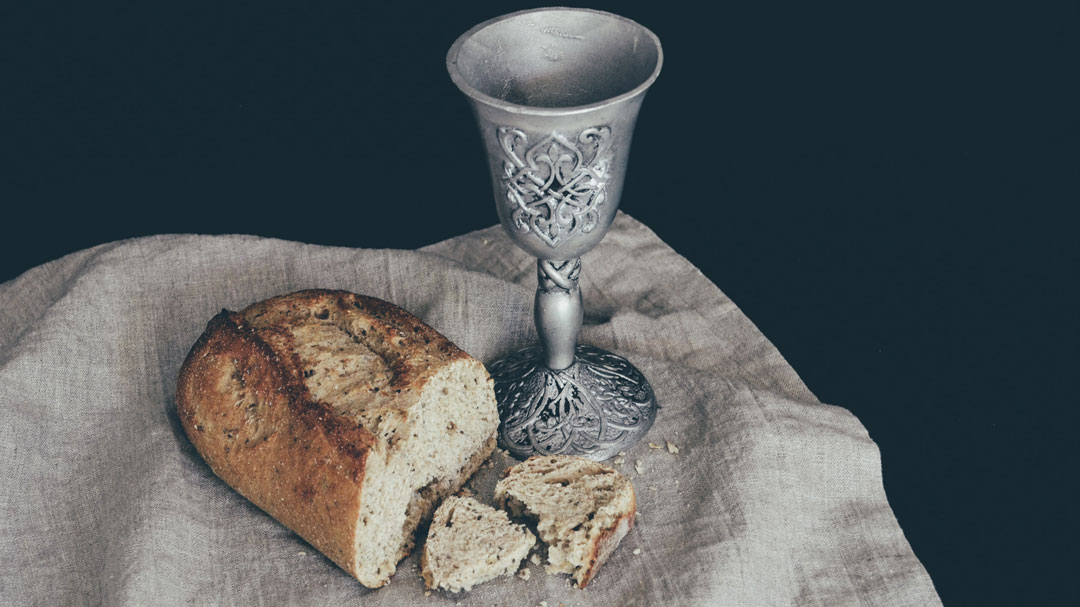The Lord’s Table “Livestream”
- Jeff Crotts

I am finishing this post in my makeshift office and it is now Tuesday. My focus has turned toward two more up and coming livestream services. Friday evening Passover and Resurrection Sunday. Streaming worship together is different to say the least and everyone appears to be adjusting. Some of you may actually enjoy the convenience of no commute. Or, amenities at home while you worship? I am grinning as I write but thinking, “Not really.”
So, as a church we have one more adjustment to consider. Communion via livestream. To alleviate any confusion let me say, I am using the terms “Communion”, “The Lord’s Supper”, and “The Lord’s Table” interchangeably. We had a staff planning meeting last week and a healthy debate sprung up on the validity of having the Lord’s Supper via livestream. Apparently we are not the only ones debating this idea. Is it wise or even right to share the Lord’s Table when we cannot physically gather corporately? One option is to simply pause this action until we can all come back under the same roof.
I will put myself out there to say, I believe we should do it livestream. However, I assume some of you might not be on the same page. Participating in the Lord’s Supper is one of the most sacred events in the life of the church.
Let a person examine himself, then, and so eat of the bread and drink of the cup. For anyone who eats and drinks without discerning the body eats and drinks judgment on himself (1 Corinthians 11:28-29).
Like me, most of you have never observed communion outside the walls of a church building. So doing anything different has to raise your antenna. Alaskans are notoriously non-traditional, so our crowd might be the exception. Wherever your conviction lies on this, I admit that this warrants some thought. Our practice is more than mere preference.
The Lord’s Supper is one of the ordinances of the church. What makes an assembly a church is practicing The Lord’s Supper and Baptism. (BTW, I personally add preaching and church discipline to this list.) The bottom line is that our church practices Communion because Jesus tells us to.
In the same way also he took the cup, after supper, saying, “This cup is the new covenant in my blood. Do this, as often as you drink it, in remembrance of me” (1Corinthians 11:25).
The trend of social distancing for the foreseeable future might mean a Communion pause, in which case we may be signing up for a long wait. I will be curious to see if this “debate” suddenly goes away. All kinds of eureka moments or “I never thought we could do it this way” comments suddenly appear. Debating this practice via livestream reminds me of many other pragmatic decisions the church has had to make even during my lifetime. One service or two? Saturday services? Overflow rooms with livestream. Etcetera.
My concern is that our church does not miss the blessing of Communion. God calls us to practice this as a means to grow. To especially connect with the reality of Christ’s death for our sins. I also do not want to be guilty of not following the Lord’s command. So what do we do?
Discussing the pros and cons of practicing the Lord’s Supper via livestream, a staff member commented: “We are either having church these days or not.” The proverbial rubber was meeting the road. Our current way of gathering through tech is either both meaningful and real or not. Are we still attending church these days? I guess this is really the debate. Of course meeting via livestream is less than ideal. Some of you post comments when we meet but we have to admit our koinonia fellowship is hindered. Obeying the “one-anothers” is not the same. Still, we are doing the best we believe we can to gather as a flock and I envision participating in the Lord’s Supper together in a meaningful way. When I lead us through this act on Friday evening I will not see your faces but I will know you are out there. And from my perspective, that matters.
Paul gives primary instructions for this ordinance from 1 Corinthians 11. I admit that right in this context, Paul uses the phrase, “when you come together” (1 Cor. 11:17,18, and 20). Obviously, Paul is talking about physically gathering. I get this. But, bear in mind that Paul was rebuking the Corinthians for being cavalier, greedy, and getting drunk and divisive when they gathered! Sins rooted in selfishness. Calling out corporate sins assumes they were supposed to practice corporate Communion. I also get this.
Still, this same context has an equal emphasis on an individual’s heart as he or she receives Communion. Believers remember Christ’s blood on their behalf, while proclaiming Christ’s death until he comes (cf. vv. 25, 26)! Also, Paul warns us to examine our own hearts, making sure we are right with the Lord to avoid God’s punishment (1 Cor. 11:28-30).
The church began when the promised Holy Spirit came and Peter preached at Pentecost (cf. Acts 2). The Lord suddenly added 3,000 people to His church. Acts 2:46 in a very natural way represents the church in its infancy, meeting in mass and also in home settings.
And day by day, attending the temple together and breaking bread in their homes, they received their food with glad and generous hearts (Acts 2:46).
Livestreaming while in quarantine does not capture the full identity of house fellowship in the early church. But, let us try to make the best of our current circumstance. Be blessed on Good Friday and Resurrection Sunday!
He has Risen!










